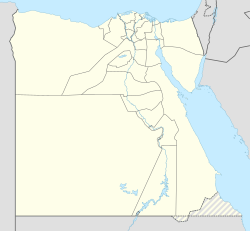KV59
| KV59 | |
|---|---|
| Burial site of Unknown (unused) | |
| Coordinates | 25°44′18.9″N 32°36′02.3″E / 25.738583°N 32.600639°E |
| Location | East Valley of the Kings |
| Discovered | Unknown |
| Excavated by | Howard Carter? University of Basel (2010–11) |
| Decoration | Undecorated |
← Previous KV58 Next → KV60 | |
Tomb KV59 is an unused tomb located in the Valley of the Kings, in Egypt. It is located in a side valley between KV37 and KV26 and opposite KV31. It is not known for certain when the tomb was discovered or by whom. It was excavated and mapped in 2010–2011 by the University of Basel. The tomb had filled with debris washed in from several floods and the rock was affected by moisture but otherwise it appeared to be unused.
Location and excavation
[edit]KV59 is located north of KV37[1] and KV26 and opposite KV31 in the side valley leading to the tomb of Thutmose III (KV34). It is not known when the tomb was discovered or by whom.[2] It was first noted in the 1880s by Eugène Lefébure and it appears as an unnumbered sketch plan in his publications of the valley.[3] It may have been first excavated by Howard Carter.[4] The location was recorded by the Theban Mapping Project but the site was lost. The tomb entrance was relocated 2 metres (6.6 ft) below the modern ground level.[4]
The tomb was excavated in 2010 and 2011 by the University of Basel's Kings' Valley Project. The shaft was filled with rocky debris. The shaft opened onto a single chamber which contained sediment washed in by several phases of flooding. The resulting moisture affected the surrounding rock, causing part of one wall and the ceiling to collapse. The tomb contained a few pieces of pottery, washed in the past. There is no evidence that the tomb was ever used for a burial. In 2010, an iron door was installed over the entrance to protect the tomb. It was accurately mapped in 2011 following the conclusion of the excavation.[4][2]
Citations
[edit]- ^ Reeves & Wilkinson 1996, p. 187.
- ^ a b Bickel, Paulin-Grothe & Alsheimer 2011, pp. 1–2.
- ^ Reeves & Wilkinson 1996, p. 68.
- ^ a b c Bickel 2010, p. 2.
References
[edit]- Bickel, Suzanne (2010). "Preliminary Report on the Work Carried out During the Season 2010" (PDF). University of Basel. University of Basel Kings' Valley Project. Retrieved 20 April 2023.
- Bickel, Suzanne; Paulin-Grothe, Elina; Alsheimer, Tanja (2011). "Preliminary Report on the Work Carried out During the Season 2011" (PDF). University of Basel. University of Basel Kings' Valley Project. Archived (PDF) from the original on 28 November 2021.
- Reeves, Nicholas; Wilkinson, Richard H. (1996). The Complete Valley of the Kings: Tombs and Treasures of Egypt's Greatest Pharaohs (2010 paperback ed.). London: Thames and Hudson. ISBN 978-0-500-28403-2. Retrieved 22 April 2023.
External links
[edit]- Theban Mapping Project: KV59 includes detailed maps of most of the tombs.

